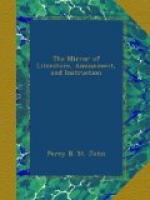* * * * *
MISS KEMBLE’S TRAGEDY.
FRANCIS I.
I passed him with his train,
The gathering crowd thronging and clamouring
Around him, stunning him with benedictions,
And stifling him with love and fumes of
garlic;
He, with the air he knows so well to don,
With cap in hand, and his thick chestnut
hair
Fann’d from his forehead, bowing
to his saddle,
Smiling and nodding, cursing at them too
For hindering his progress—while
his eye,
His eagle eye, well versed in such discernment,
Roved through the crowd; and ever lighted
where
Some pretty ancle, clad in woollen hose,
Peeped from beneath a short round petticoat,
Or where some wealthy burgher’s
buxom dame,
Decked out in all her high-day splendour,
stood
Showing her gossips the gold chain, which
lay
Cradled upon a bosom, whiter far
Than the pure lawn that kerchieft it.
A BEAUTY.
Had a limner’s hand
Traced such a heavenly brow, and such
a lip,
I would have sworn the knave had dreamt
it all
In some fair vision of some fairer world.
See how she stands, all shrined in loveliness;
Her white hands clasped; her clustering
locks thrown back
From her high forehead; and in those bright
eyes
Tears! radiant emanations! drops of light!
That fall from those surpassing orbs as
though
The starry eyes of heaven wept silver
dew.
A BETROTHED LOVER’S FAREWELL.
Ay; but ere I go, perchance for ever,
lady,
Unto the land, whose dismal tales of battles,
Where thousands strew’d the earth,
have christen’d it
The Frenchman’s grave; I’d
speak of such a theme
As chimes with this sad hour, more fitly
than
Its name gives promise. There’s
a love, which born
In early days, lives on through silent
years,
Nor ever shines, but in the hour of sorrow,
When it shows brightest: like the




